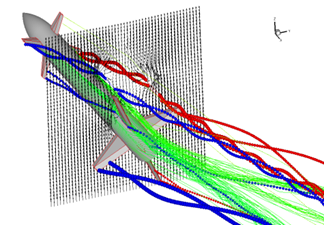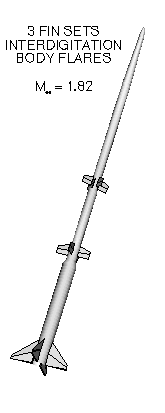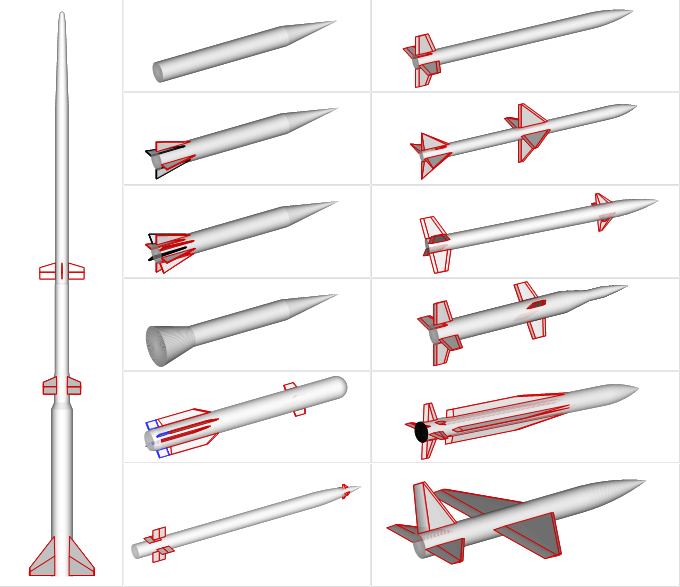| |
Missile Aerodynamics Prediction: MISL3
For software licensing information please contact:
[email protected]

 MISL3 Missile Aerodynamics Prediction Software
High Angle of Attack
Angular Rates
Nonuniform Flow Fields
Body Flares and Boattails
Arbitrary Interdigitation between Fin Sets
MISL3 Missile Aerodynamics Prediction Software
High Angle of Attack
Angular Rates
Nonuniform Flow Fields
Body Flares and Boattails
Arbitrary Interdigitation between Fin Sets
Fast-running, engineering-level missile aerodynamics predictions for analysis and design. MISL3 efficiently predicts longitudinal and lateral aerodynamic characteristics including damping derivatives and is essential for generating aerodynamic data bases for flight simulations. Models axisymmetric bodies with up to three fin sections with fully deflectable fins. Bodies may have conical changes in body diameterr: flares and boattails. Based on high resolution, high angle-of-attack, experimental data bases and advanced equivalent angle-of-attack concept. Detailed body and fin vortex modeling for induced nonlinear effects between fin sets.
As an option, MISL3 can be linked with the NEAR store separation program STRLNCH for detailed aerodynamic analysis of store carriage loads and trajectories.
MISL3 is available for Windows and Linux computers subject to license fees and a software license agreement. Delivery to foreign contries requires U.S. State Department export license. NEAR recommends a two-day training course which includes interpretation of the output and "hands-on" code running.
MISL3 Database Generation Example
Canard-Tail Missile with body and fin vortex shedding and wake tracking
2400 flow conditions, M∞, αc, φ, and δ
Intel Core2 2.33 GHz processor
330 CPU seconds, 0.1375 seconds/case
Applicable Configurations
Up to 3 fin sections
1,2,3,4 or 8 fins per fin section
0.25 < fin aspect ratio, AR < 10
0 < fin taper ratio < 1
Fins with aspect ratio between 1.0 and 4.0 can be deflected (control fins)
Aerodynamic Quantities Computed
Overall 6-DOF forces and moments:
axial, side, and normal forces
rolling, pitching, and yawing moments
Aerodynamic Damping Coefficients due to Rotational Rates
Fin forces and moments:
fin axial and normal forces
fin hinge and bending moments
Body load distribution
Fin load distributions
Detailed axial force breakdown
Range of Flow Parameters
Subsonic, transonic, supersonic Mach numbers
Angles of attack up to 90 deg
Roll angle is arbitrary
Fin deflection angles up to 40 deg
Interdigitation angles between fin sets arbitrary
Important Modeling Features
Nonlinear compressibility effects at high angles of attack
Nonlinear effects of body and fin vortices
Nonlinear fin/body gap effects
Damping effects due to rotational rates (p,q,r)
Effects of user-specified nonuniform flow
Output Options
Detailed output file
TECPLOT® compatible graphics and spreadsheet files
Spreadsheet compatible files
Examples of applicable configurations

Click on images to view example results
Click for Additional Results
References below contain additional results
References
- Lesieutre, D. J. "Prediction of Sparrow Missile Aerodynamic Characteristics with a Non-Linear Engineering-Level Missile Prediction Method," AIAA 2017-3399, June 2017.
- Lesieutre, D. J. and Quijano, O. E. "Studies of Vortex Interference Associated with Missile Configurations," AIAA-2014-0213, Jan. 2014.
- McDaniel, M. A., Evans, C. and Lesieutre, D. J., "The Effect of Tail Fin Parameters on the Induced Roll of a Canard-Controlled Missile," AIAA 2010-4226, Jun. 2010.
- Lesieutre, D. J., Love, J. F., and Dillenius, M. F. E., "Prediction of the Nonlinear Aerodynamic Characteristics of Tandem-Control and Rolling-Tail Missiles," AIAA-2002-4511, Aug. 2002.
- Lesieutre, D. J., Love, J. F., and Dillenius, M. F. E., "Recent Applications and Improvements to the Engineering-Level Aerodynamic Prediction Software MISL3," AIAA 2002-0275, Jan. 2002.
- Dillenius, M. F. E., Lesieutre, D. J., Hegedus, M. C., Perkins, S. C., Jr., Love, J. F., and Lesieutre, T. O., "Engineering-, Intermediate-, and High-Level Aerodynamic Prediction Methods and Applications," Journal of Spacecraft and Rockets, Vol. 36, No. 5, Sep.-Oct. 1999, pp. 609-620.
- Dillenius, M. F. E., Lesieutre, D. J., Perkins, S. C., Jr., and Love, J. F., "Prediction of Nonlinear Missile Aerodynamics with Applications Including Store Separation," RTO-MP-5, Missile Aerodynamics, Nov. 1998.
- Lesieutre, D. J., Love, J. F., and Dillenius, M. F. E., "High Angle-of-Attack Missile Aerodynamics Including Rotational Rates - Program M3HAX," AIAA 1996-3392, Jul. 1996.
- Dillenius, M. F. E., Lesieutre, D. J., Whittaker, C. H., and Lesieutre, T. O., "New Application of Engineering Level Missile Aerodynamics and Store Separation Prediction Methods," AIAA 94-0028, Jan. 1994.
- Lesieutre, D. J., Mendenhall, M. R., and Dillenius, M. F. E., "Prediction of Induced Roll on Conventional Missiles with Cruciform Fin Sections," AIAA 1988-0529, Jan. 1988.
- Lesieutre, D. J., Mendenhall, M. R., Hemsch, M. F., and Nazario, S. M., "Aerodynamic Characteristics of Cruciform Missiles at High Angles of Attack," AIAA 87-0212, Jan. 1987.
Aero Software Licensing and Training
Missile Aerodynamics Prediction: MISL3
Detailed Missile Loads: MISDL
Euler Solver: NEARZEUSIN (with Inlets) /ZEUSBL
Aircraft Store Separation and Carriage Loads Analysis: STRLNCH
Aircraft Unsteady Maneuvering: SHAMAN
Unsteady Hydrodynamic Analysis: SUBFLO_2
User’s Training for all NEAR Software
State Department Export License and TAA Preparation as Required
For software licensing information please contact:
[email protected]
|
|
|

|





